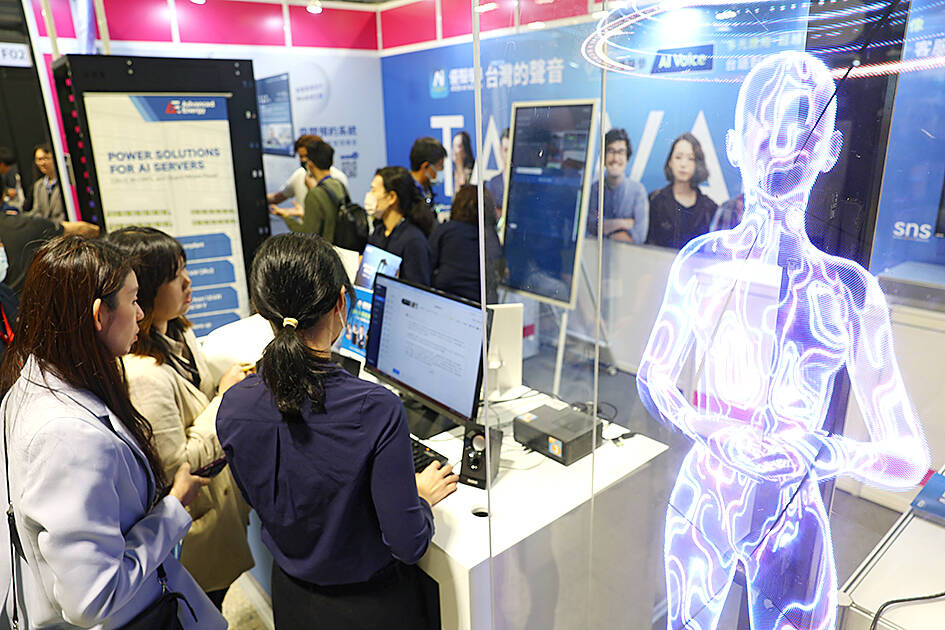The Ministry of Economic Affairs yesterday released the nation’s first white paper on the development of start-ups in Taiwan, including the domestic environment, recent policy achievements, and an overview of the overall entrepreneurial ecosystem.
As of the end of last year, 9,576 Taiwanese companies were listed on FINDIT, a government-backed start-up information platform, the ministry said in a statement.
The diverse products and services offered by these start-ups show the strong foundation the government has built for entrepreneurship, the ministry said.

Photo: CNA
According to Taiwan’s regulations, a start-up is a business that has a paid-in capital of less than NT$100 million (US$3.02 million), or hires less than 200 employees on a regular basis, and has been established for less than eight years.
The companies listed on FINDIT operate in a diverse range of businesses, including healthcare, media and entertainment, food and beverage, consumer goods, hardware manufacturing and software, the ministry said.
The most rapid growth of start-ups is in the fields of digital solutions and transformation with artificial intelligence (AI) and software, energy, sustainability and environment, the ministry said.
This reflected the government’s targeted support for strategic areas, including digital transformation, healthcare, semiconductors and AI, it said.
Energy, biotechnology and healthcare start-ups in Taiwan have been the most favored by investors, the ministry said.
Meanwhile, green energy, sustainability and carbon reduction business saw the largest increase in funding, Minister of Economic Affairs J.W. Kuo (郭智輝) said in the prologue of the white paper.
In 2023, energy start-ups attracted US$1.071 billion in investment thanks to the demand for energy saving, power storage, and power management solutions, the white paper said.
Companies in the biotechnology and health business received US$564 million in funding in 2023, FINDIT data showed.
Taiwanese start-ups generally place importance on research and development, as nearly 70 of them have technical staff and operate with technology development as their core business, the ministry said.
The white paper also has information regarding government support available to entrepreneurs, including subsidies, loans, investments and help attending trade events, the ministry said.

Real estate agent and property developer JSL Construction & Development Co (愛山林) led the average compensation rankings among companies listed on the Taiwan Stock Exchange (TWSE) last year, while contract chipmaker Taiwan Semiconductor Manufacturing Co (TSMC, 台積電) finished 14th. JSL Construction paid its employees total average compensation of NT$4.78 million (US$159,701), down 13.5 percent from a year earlier, but still ahead of the most profitable listed tech giants, including TSMC, TWSE data showed. Last year, the average compensation (which includes salary, overtime, bonuses and allowances) paid by TSMC rose 21.6 percent to reach about NT$3.33 million, lifting its ranking by 10 notches

SEASONAL WEAKNESS: The combined revenue of the top 10 foundries fell 5.4%, but rush orders and China’s subsidies partially offset slowing demand Taiwan Semiconductor Manufacturing Co (TSMC, 台積電) further solidified its dominance in the global wafer foundry business in the first quarter of this year, remaining far ahead of its closest rival, Samsung Electronics Co, TrendForce Corp (集邦科技) said yesterday. TSMC posted US$25.52 billion in sales in the January-to-March period, down 5 percent from the previous quarter, but its market share rose from 67.1 percent the previous quarter to 67.6 percent, TrendForce said in a report. While smartphone-related wafer shipments declined in the first quarter due to seasonal factors, solid demand for artificial intelligence (AI) and high-performance computing (HPC) devices and urgent TV-related orders

Prices of gasoline and diesel products at domestic fuel stations are this week to rise NT$0.2 and NT$0.3 per liter respectively, after international crude oil prices increased last week, CPC Corp, Taiwan (台灣中油) and Formosa Petrochemical Corp (台塑石化) said yesterday. International crude oil prices last week snapped a two-week losing streak as the geopolitical situation between Russia and Ukraine turned increasingly tense, CPC said in a statement. News that some oil production facilities in Alberta, Canada, were shut down due to wildfires and that US-Iran nuclear talks made no progress also helped push oil prices to a significant weekly gain, Formosa said

MINERAL DIPLOMACY: The Chinese commerce ministry said it approved applications for the export of rare earths in a move that could help ease US-China trade tensions Chinese Vice Premier He Lifeng (何立峰) is today to meet a US delegation for talks in the UK, Beijing announced on Saturday amid a fragile truce in the trade dispute between the two powers. He is to visit the UK from yesterday to Friday at the invitation of the British government, the Chinese Ministry of Foreign Affairs said in a statement. He and US representatives are to cochair the first meeting of the US-China economic and trade consultation mechanism, it said. US President Donald Trump on Friday announced that a new round of trade talks with China would start in London beginning today,